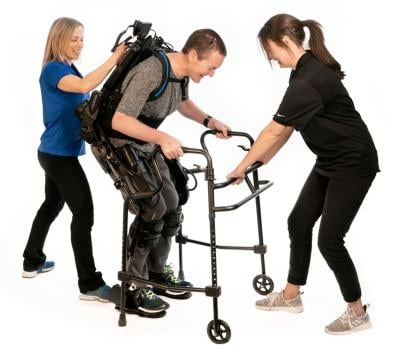To help multiple sclerosis patients who have trouble walking, Ekso Bionics is taking a leap forward with the first FDA clearance in the condition for a robotic exoskeleton suit that provides power and balance to the legs.
Previously cleared in the U.S. and Europe for assisting people with brain and spinal cord injuries, as well as those recovering from a stroke, the company’s EksoNR is designed to be used as part of a rehabilitation program. It helps the wearer stand up out of a wheelchair and learn to walk again.

The FDA’s latest 510(k) green light expands the suit’s reach to more patients, as Ekso estimates nearly 1 million people in the U.S. and as many as 2.8 million globally have been diagnosed with MS. By reinforcing the hips, knees and ankles to help support a natural walking gait, the device aims to enable extended, inpatient therapy sessions without fatigue.
The system has been in use at more than 375 rehabilitation centers worldwide and has accounted for more than 200 million powered steps, according to Ekso. The morning of the clearance’s announcement, the company’s stock on the Nasdaq rose about 20% to about $2.10.
The FDA first OK'd EksoNR in 2016 for stroke and spinal cord injury rehabilitation. It garnered a second clearance in 2020 for acquired brain injuries including from trauma or damage resulting from an aneurysm, brain tumor, loss of oxygen or other conditions.
In the future, the company says it is considering indications in cerebral palsy and Parkinson’s disease as well as in orthopedics and recovery after surgery in addition to expanding into outpatient rehabilitation centers. Ekso reported $11.25 million in revenue for 2021.
The company also produces EksoUE, designed for the upper extremities to power the arms in cases of weakness or paralysis. That approach is used in industrial and construction settings as well, with spring-loaded vests designed to support long hours of ergonomically taxing or repetitive work. Ekso previously partnered with Ford and Boeing to employ its wearable exo suits on its automobile and aircraft manufacturing lines.
The FDA handed out its first clearance to a powered exoskeleton for spinal cord injuries in 2014, to Argo Medical Technologies—a company since renamed ReWalk Robotics. Its latest device received a breakthrough designation from the agency last November for a smaller, bootlike system designed to help restore ankle function in rehabilitation following a stroke.
Last March, ReWalk announced that a man who had been paralyzed from the waist down had used the company’s robotic exoskeleton to climb the stairs of a 51-story London skyscraper—scaling 1,444 steps in just over six hours and earning him his second spot in the Guinness World Records. His first came in 2018 when he used the powered suit to walk the London Marathon.